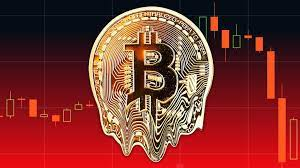Savers have spoken of terrible losses as assets like bitcoin and stablecoins like terra have plummeted.
The recent crypto bubble has all the signs of another case of the "Robinhood economy," named after the renowned American stock trading program.
White collar professionals who were bored at home due to pandemic lockdowns but had a lot of spare cash turned to day trading to pass the time. Subscribers to the popular online discussion site Reddit's r/WallStreetBets forum more than doubled over the course of 2020, then quadrupled in the first month of 2021, as a small army of retail investors flooded into assets as diverse as the then-bankrupt car rental company Hertz, the troubled video game retailer GameStop, and the electric car manufacturer Tesla, pushing the latter from $85 at the start of the pandemic to a high of $1
The increase in day trading benefitted cryptocurrencies as well. Bitcoin has risen from $5,000 in March 2020 to more than $60,000 one year later. The currency has previously experienced such a rapid increase: in 2017, it more than doubled to a peak of $19,000. However, in the most recent boom, ethereum, the number two cryptocurrency, rose even more impressively, from $120 to about $5,000 in 2021.
Bitcoin trade has skyrocketed over the last decade.
Cryptocurrency refers to any digital asset that functions similarly to bitcoin, the first cryptocurrency, which was developed in 2009. A "decentralized ledger" tracks who owns what and is incorporated into a "blockchain," which protects the whole network by guaranteeing transactions are irreversible once completed. In the years following, a dizzying array of versions have emerged, but the core - the blockchain concept - has remained relatively steady, thanks in part to the societal implications of completely decentralized networks being resistant to government inspection or control.
Whereas ten years ago, individuals only mentioned trading in bitcoin, the space has exploded. In addition to cryptocurrencies, the industry has evolved into a complicated ecosystem.
It includes Web3, a greater range of cryptocurrency-based apps and services, DeFi, an attempt to build an entire financial sector out of code rather than contracts, and non-fungible tokens (NFTs), which utilize the same technology as cryptocurrencies to trade in things rather than money.
The influx of funds into the crypto industry did more than merely boost the paper riches of current stockholders. Instead, it sparked a spike in interest in, and financing for, a wide range of projects targeted at capitalizing on cryptocurrencies' underlying technology.
The sector's "decentralized finance" potential were enticing to a new generation of investors. The "DeFi" [decentralised finance] sector, built on the "programmable money" of the ethereum cryptocurrency, is an attempt to extend bitcoin's anti-establishment attitude to include the whole economy.
Consider the fairly modest crypto market segment known as NFTs.
NFTs graph:
NFTs, a 2014 product, leverage the technology used to produce cryptocurrencies and allow inventors to attach unique assets to the blockchain instead of money-like currencies.
This implies that NFTs representing works of art, virtual treasures, or even event tickets or club membership can be traded. They, like cryptocurrencies, may be purchased and traded on open exchanges, stored anonymously, and bundled up or securitized in complicated financial products.
 |
| Bored Ape Yacht Club #4418 |
NFTs in the Bored Ape Yacht Club collection have consistently sold for $1-3 million each.
Individual NFTs sold for ridiculous sums of money in mid-2021, creating a bubble inside a boom.
One token, reflecting years of effort by digital artist Beeple, was sold for $69 million, while another, related to the first tweet made by Twitter founder Jack Dorsey, was purchased for $2.9 million. Individual NFTs in the Bored Ape Yacht Club collection — the most constantly sought-after examples of "profile shot" NFTs, meant to be used as pre-packaged online identities – typically sell for $1m-$3m.
However, by the beginning of 2022, the NFT bubble looked to have burst. "Floor" prices for major NFT collections had collapsed, and while many large NFT acquisitions remained in private hands, those that were resold fared poorly: Dorsey's tweet
Then there was the accident.
The crypto crisis has occurred against the backdrop of broader market issues, such as investor concerns over the Ukraine conflict, increasing inflation, and higher borrowing prices. Some market observers dismiss the possibility of a crypto meltdown causing severe issues in other financial markets or the global economy. The total worth of all cryptocurrencies is presently over $1 trillion (with bitcoin accounting for roughly 40% of the total), compared to around $100 trillion for the world's stock markets.
Since November, the value of all cryptocurrencies has gone from $3 trillion to $2 trillion, implying that $2 trillion in wealth has been lost, with no substantial knock-on repercussions to the larger stock market - so far.
So far, the upheaval has been confined to the cryptocurrency industry. Some of the same economic challenges that have damaged the global economy and stock markets have also harmed digital assets. Concerns about growing inflation and the subsequent hikes in interest rates by central banks have weighed on Bitcoin and other cryptocurrencies, making riskier assets less appealing to investors. As a result, as stock markets fell, so did crypto assets.
The terra crash harmed investor trust in cryptocurrencies.
However, the fall of terra last month harmed investor trust in cryptocurrencies. Celsius, a bitcoin lender, was forced to halt customer withdrawals in June. In addition, a hedge fund that placed large wagers on cryptocurrency markets has been forced to liquidate.
Crypto investors and organizations that had bet on the cryptocurrency market with digital assets as collateral were obliged to liquidate.
The terra collapse has also raised regulatory worries regarding stablecoins, which are backed by traditional assets and hence may represent a danger to the financial system as a whole. In the United Kingdom, the Treasury wants a system in place to cope with a stablecoin failure, stating in May that a terra-like failure might jeopardize "continuity of services crucial to the running of the economy and access of individuals to their monies or assets."
"Even the top three stablecoins have reserves totaling $140 billion in conventional assets, the majority of which is in commercial paper and US treasuries." "A run on the largest currency (tether) redemptions might destabilize the entire crypto asset system and spread over into other markets," warns Carol Alexander, professor of finance at the University of Sussex Business School.
In other news, the European Union is developing a regulatory framework for crypto assets with the goal of implementing it by 2024, while in the United States, Joe Biden has signed an executive order directing the federal government to coordinate a regulatory plan for cryptocurrencies, including ensuring "sufficient oversight and safeguard against any systemic financial risks posed by digital assets." According to the Federal Trade Commission, the US consumer watchdog, 46,000 consumers have lost more than $1 billion to cryptocurrency scams since the beginning of 2021.
'I'm confident that cryptocurrency will bubble again.'
The future of cryptocurrency is an unanswerable question. According to supporters like Changpeng Zhao, the multibillionaire owner of the Binance cryptocurrency exchange, the sector will rebound - albeit it may take some time. "I think with this price decline... it will certainly take a long to come back," he said last week to the Guardian. "It will most likely take a few months or a few of years."
Stablecoins are an essential component of the cryptocurrency ecosystem. Their value is locked to that of a traditional currency, allowing users to cash out of dangerous positions without the hassle of a bank transfer, and allowing crypto-native banks and DeFi institutions to operate without incurring currency risk.
Stablecoins, in effect, act as the crypto economy's banks, letting users to keep their money safely while knowing it is not exposed to wider danger. That is, when a stablecoin fails, it has the same impact as a bank failure: money evaporates across the ecosystem, liquidity dries up, and other institutions begin to fail in a domino effect.
The breakdown of the terra/luna stablecoin triggered the start of the new cryptocurrency crisis.
So, on May 9, a stablecoin known as UST "depegged," plummeting from $1 to $0.75 in a single day, and then plunging further, and further, and farther. Within four days, the luna blockchain was completely shut down, and the project was deemed defunct.
Unlike Terra, tether is a "centralised" stablecoin, with reserves that, according to the corporation, are always redeemable one-to-one for a tether token. The model ensures that it cannot enter a "death spiral" like terra, but it also means that the token's stability is totally dependent on how much one believes tether to actually maintain its reserves.
Tether and Bitfinex, a bitcoin exchange that shares an executive staff with Tether but is legally different from it, "recklessly and criminally covered-up significant financial losses to keep their scam continuing and preserve their bottom lines," New York Attorney General Letitia James stated at the time.
The two firms had sent money back and forth to conceal their insolvency, she said, and had failed to verify that tether was "completely supported at all times," according to the probe.
Tether, for one, remains quite positive - and has even hinted that it may disclose a full audit of its reserves, which it previously stated was "months away" in August 2021.
Tether announced another expansion in late June: the launch of the first GBP stablecoin. "We think that the United Kingdom is the next frontier for blockchain innovation and the broader use of bitcoin for financial markets," says Paolo Ardoino, chief technical officer of Tether and Bitfinex.
"Tether is prepared and eager to collaborate with UK regulators to make this ambition a reality."
===
Images culled from Google search.
bitcoin, bitcoin price, bitcoin news, bitcoin mining, bitcoin price usd, bitcoin chart, bitcoin stock, bitcoin price today, bitcoin value, bitcoin cash, bitcoin wallet, bitcoin bank, what is bitcoin, bitcoin USD, bitcoin money, what is a bitcoin and how does it work? bitcoin website, coin bitcoin, what is bitcoin used for, what is bitcoins
bitcoin meaning, what are bitcoins used for, new bitcoin, bitcoin uses, what is bitcoin Wikipedia, how is bitcoin created, bitcoin price chart, coinbase, bitcoin market, bitcoin technology, what are bitcoins, bitcoins, bitcoin crypto, btc bitcoin, bitcoin max, bitcoin wiki, coinbase buy, bitcoin wikipedia
bitcoin cryptocurrency, cryptocurrency bitcoin, give me bitcoin, bitcoin to USD, bitcoin price history, bitcoin calculator, bitcoin server, how do cryptocurrencies make money, bitcoin exchange, coinbase login, btc code, how to buy cryptocurrency, bitcoin volume chart, bitcoin wallet login, bitcoin account, bitcoin office, bitcoin business, free bitcoin address, bitcoin what is it, bitcoin address login
bitcoin price prediction, bitcoin is peer to peer currency, bitcoin model, bitcoin system, bitcoin co, what is the process of creating bitcoin popularly known as? how many bitcoins will ever be created? what type of currency is bitcoin? how are bitcoins generated? Data not available, bitcoin history, 2 bitcoin, why is bitcoin, what's bitcoin, the bitcoin, bitcoin real, bitcoin today, coinbase.com app, how to own bitcoin
about bitcoin, what are bitcoin, where is bitcoin, how is bitcoin, cryptocurrency, how to buy bitcoin, a bitcoin, bitcoin to money, money bitcoin,bitcoin prediction, bitcoin help, what is a bitcoin, how bitcoin price works, bitcoin business meaning, what is bitcoin meaning, bitcoin payment method, bitcoin definition, bitcoin real value, how does bitcoin work, bitcoin information, everything you need to know about bitcoin 2022, what does bitcoin look like on computer













0 Comments